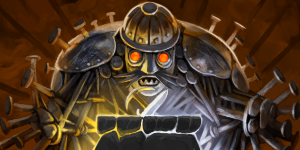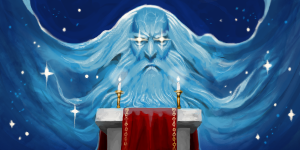
Nandrew
Gods: now with added flexibility!

Doesn’t Binlor look just awesome?
If I was required to mention one aspect of Desktop Dungeons that has been changed the most over its lifespan, I’d probably point to the religion system. God appeasement in DD has evolved from one-shot microquesting and stackable blessings to a more complex system of boons, piety levels and behaviour conditions — for better AND worse.
While we like the general approach as it stands now, there’s been a few harmful behaviours that the system encourages, and we’re working to get rid of them. We’re also adding a few new religious behaviours which give advanced players something new to consider and — hopefully — take advantage of. Details below!
Cracking down on altar scumming
Scumming is a problematic behaviour in many randomly-generated game worlds. In short, it’s about quickly and easily resetting a game situation over and over until optimal situations are created for the player (for example, The Amulet of Awesome Power spawning right next to a dungeon entrance).
In Desktop Dungeons, “dungeon scumming” takes place most frequently at high levels of play, often done for the purposes of finding an ideal altar at the earliest moment possible. Finding altars later on tends to reduce the overall piety earnings, so players working through particularly challenging dungeons are sometimes tempted to start a game, wander a few squares and reset if they don’t find what they’re looking for. The process can be repeated quickly, easily and almost indefinitely, turning the game experience into an exercise of patience and repetition rather than skill.
To avoid this, gods are being rebuilt in a way that their time of discovery matters less:
– In some cases, this is just a matter of keeping more detailed piety tracking BEFORE a god is worshipped — Taurog usually rewards you with piety for killing creatures, but he’ll also pay close attention to monsters you killed while not actively serving any gods.
– Some gods have built-in piety slingshots. For example, one aspect of the Earthmother that remains unchanged is the ability to harvest massive amounts of piety by growing plants on corpses (something that actually becomes MORE effective when used later). Dracul draws on players sacrificing their maximum hit points for piety boosters.
– Other gods tend to make more demands of long-term worshippers, meaning that an early discovery can lead to more work over a character’s lifespan. Binlor is an important demonstration of this, since players actually incur a piety LOSS every time they level up, meaning that they constantly have to work for their god’s approval. If a Binlor follower is lazy, they risk punishment.
– Some gods have quirks which can harm players if they’re excessively worshipped. Mystera’s boons, for example, are cheap, plentiful and recastable — however, all of them have side effects which strengthen monsters in some way, so even if a player earns loads of piety, they’ll still have to decide whether or not they actually want to spend it.

He wields a +3 beard of strictness
Moving away from extremes
Typically, players have an ideal god/character combination for several situations: wizards like Mystera, fighters gravitate towards Taurog, et cetera et cetera. This has the tendency to create an incredibly narrow-minded view of character builds (an otherwise complex wizard character becomes slightly less interesting when given permission to focus entirely on magic, for example). It also means that players looking for that “ideal god” feel cheated when, for example, their berserker stumbles upon an altar dedicated to Tikki Tooki.
Nowadays, gods are a little more cosmopolitan, aiming to appeal to a broader range of characters:
– The taboos for any given god tend to be less strictly enforced. Taurog, for example, is significantly less annoyed by spellcasting and no longer mana burns new worshippers, making it more feasible for characters like sorcerers to get in and worship him.
– Conversion between gods is a lot more flexible. Worship can be transferred between any two deities at any time for a scaling piety cost, so our hypothetical Taurog-worshipping sorcerer can grab a boon or two for a slight mana penalty before switching to Mystera and undoing some of those magical deficits. Overall, it creates a slightly more powerful (but still well-balanced) character build.
– Individual gods have a broader range of boons to draw from (each deity has at least six, in fact). These boons do their best to cover a healthy range of situations rather than specialising too heavily. So instead of god X being the ideal counter to situation Y, it has a slightly less exaggerated effect in situations A, B, C, Y and Z.
Giving value to dud combos
If you’re still absolutely adamant that your favourite god is the Glowing Guardian and engage in a hardcore bout of monotheism, you’ll be happy to know that the Dracul altar down the hall still presents a useful opportunity: altar desecration.
If you find a god completely useless to you, you may destroy their altar in the name of your current god. This has two immediate effects: one, favour with your deity skyrockets, allowing you to buy more boons and avoid some punishments. Two, the offended god immediately punishes you. In effect, you’re improving your chances with a chosen god at the cost of pissing another one off.
This is by no means a trivial decision: divine punishment can be absolutely awful, but in the right situations (or with the right equipment, such as the new Agnostic’s Collar), suffering the backlash of altar destruction may give you just what you need to finish a level with your god of choice.
To discuss the gods fully would require quite a few more words (even in the freeware, it’s a rather large system to digest) but by the time the beta for Unity DD comes out, we’ll have rolled out a squeaky-clean divine roster (with new graphics, such as those above) that players will be able to pick at, respond to and hopefully have loads of fun with.

July 5th, 2011 at 5:45 pm
You know what would be cool?
To have messages of highscoreplayers displayed on signs somewhere in randomly created dungeons. The higher your score is, the higher the chance of your (short-)message to be in the game.
July 5th, 2011 at 8:36 pm
I remember trying to determine the optimal number of tiles to discover before worshiping pactmaster so I could get bonus xp as quickly as possible. Hopefully drac won’t insta kill you for slaying too many of the undead.
@X-site
I have no idea what that has to do with this blog entry.
July 5th, 2011 at 8:54 pm
Having played through the entire free version, and finishing the campaign my favorite god was always just the pactmaker guy. He was good for every class, had no restrictions, and I found that finding him early often made the difference between success and failure in a difficult dungeon. Other gods were more situational, and usually only if I didn’t have access to the pact god.
July 5th, 2011 at 9:03 pm
Yeah, the Pactmaker is… different… now. Should be interesting.
July 6th, 2011 at 3:17 am
Good to hear. As much as I loved the pactmaker for how strong he was, he didn’t really have a lot of flavor to him.
July 10th, 2011 at 5:06 am
Reloading is bad in lots of other ways too. You can’t prevent some starts from being better or worse than others, the best way to handle this is game modes that penalize players for starting levels and then abandoning them.
July 10th, 2011 at 12:29 pm
Agreed. Probably the biggest thing at the moment that makes scumming less effective are the preparations though: You pay for what you want to start a dungeon with, if you head back out immediately, you lose that cash for no real benefit. It’s usually always worth your while investment-wise to attempt to finish a dungeon – you’ll earn gold, items to sell and maybe even a boss trophy.